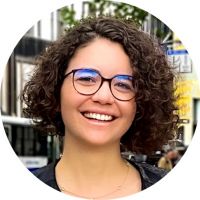Richtzenhain Doctoral Prize Awardees 2023

Uladzimir Barayeu
Because of their highly active metabolism, many tumors are susceptible to a special type of cell death, ferroptosis. In his PhD thesis, Uladzimir discovered a new mechanism by which cancer cells protect themselves against ferroptosis. Knowledge of these molecular connections could provide new starting points for the treatment of tumors.
Uladzimir completed his PhD at the DKFZ in the division of Tobis Dick and is now working as a researcher at Tohoku University in Sendai/Japan.

Chiara Falcomatà
Mesenchymal pancreatic ductal adenocarcinoma (PDAC) shows basal-like transcriptional features and the most aggressive and therapy resistant phenotype. In her doctoral thesis, Chiara showed how they discovered novel immunomodulatory therapeutic strategies to target the mesenchymal subtype of PDAC.
Chiara completed her PhD in the division of Dieter Saur at the DKTK partner site Munich/TranslaTUM and is now working as a Postdoctoral Fellow at Icahn School of Medicine at Mount Sinai in New York City/USA.

Tuyu Zheng
Tuyu's thesis work focused on ependymoma, the third most common children's brain tumor. She generated representative mouse models for these molecularly complicated tumors, which allowed her to characterize a previously poorly understood gene C11orf95 (now designated as ZFTA) and to identify GLI2 as a potential therapeutic target for ependymomas.
Tuyu completed her PhD at the DKFZ in the division of Stefan Pfister and will start a postdoc position at St. Jude Children's Research Hospital in Memphis, Tennessee/USA.

Lukas Frank
Gene transcription and telomere maintenance are altered in tumor cells. Lukas developed imaging approaches to probe transcription factor function and map the alternative lengthening of telomeres (ALT) pathway in cancer cell lines and patient samples. This has advanced the dissection of transcription, ALT-linked cancer vulnerabilities and tumor heterogeneity across biological scales.
Lukas completed his PhD at the DKFZ in the division of Karsten Rippe and is now continuing his research as a postdoc at the Netherlands Cancer Institute (NKI) in Amsterdam.

Thomas Heisser
Thomas' thesis evaluated the need and potential of gender-specific strategies to improve colorectal cancer screening, focusing on optimized intervals for screening colonoscopy and by comparing long-term outcomes of different screening modalities in simulations. The project derived recommendations to improve screening offers in Germany, e.g., by complementing offers for the elderly.
Thomas is continuing his thesis research as a postdoc at the DKFZ in the division of Hermann Brenner.

Annika Reinke
AI-based biomedical image analysis previously relied on flawed validation. The objective of Annika's thesis was to systematically reveal critical quality issues in validation practice and to propose solutions to eliminate them. These strategies have already proven their practice-changing impact and substantially increased the overall quality of validation.
Annika is continuing her thesis research as a postdoc at the DKFZ in the division of Lena Maier-Hein.
